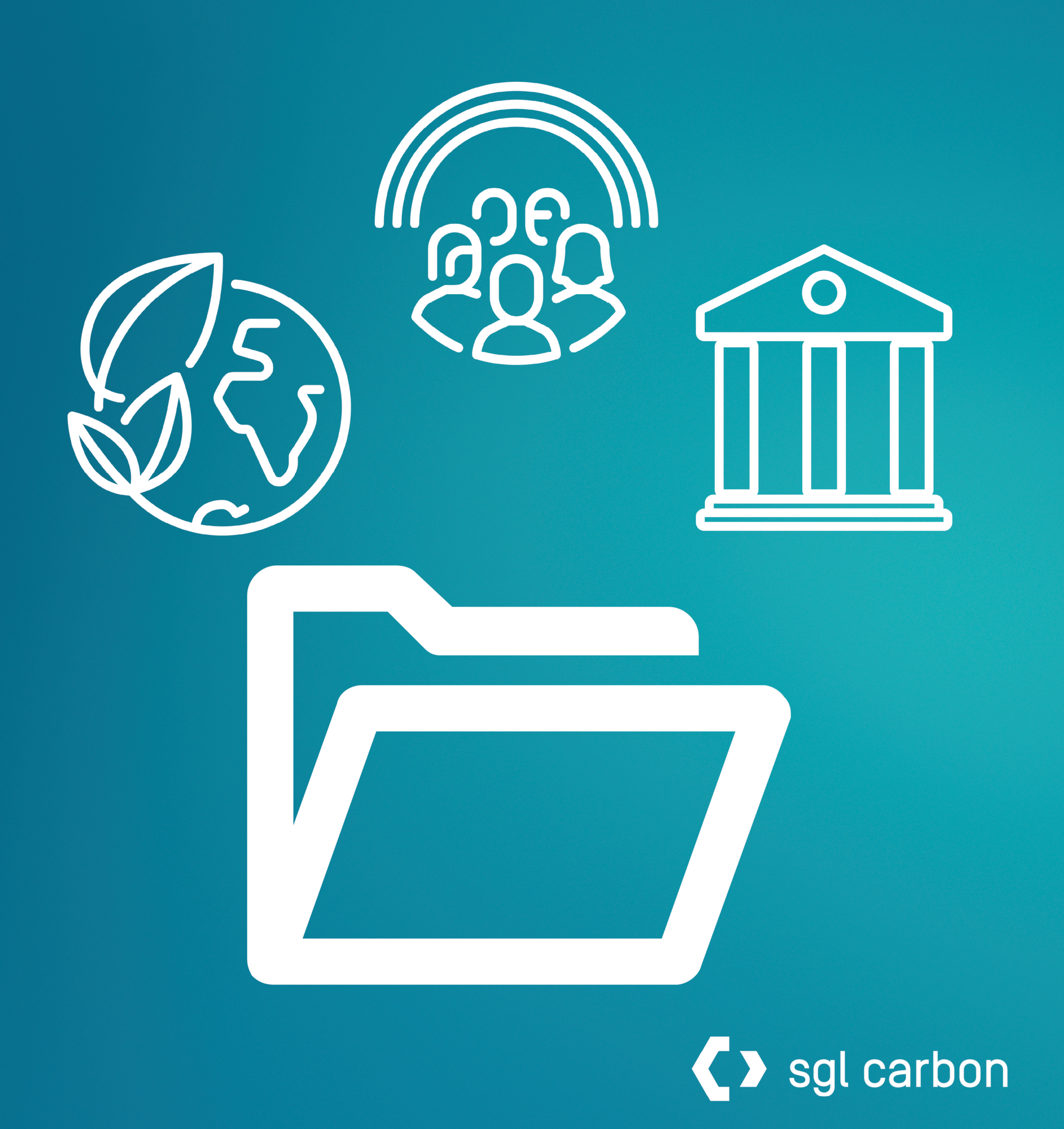But not only our products should predominantly stand for sustainability, our manufacturing and management processes as well as our supply chains should also meet high environmental, social and governance standards. In addition to complying with all legal requirements, we want to strategically exploit opportunities and positive sustainability effects of our activities and further reduce negative impacts. For continuous further development, we have set ourselves clear ESG targets to underline our ambitions.
Find out more about our approach, our ambitions and our performance:
SGL Carbon defined ambitious targets in all three ESG categories

Corporate social responsibility report
In our CSR report, we present our sustainability ambitions and goals, report on the status of developments based on comparable key figures, and on measures to continuously improve our ESG performance. These include resource-conserving and environmentally conscious behavior, fair and responsible interaction with employees, customers and suppliers, respecting human rights, the promotion of sustainable product solutions and compliance and anti-corruption standards.
ESG Factbook

We make our ESG ambitions measurable. In addition to the annual CSR report, we have summarized all important ESG information in a Factbook, organized by ESG aspects. The ESG Factbook comprises published ESG data of SGL Carbon as of 2019 including ESG reporting standards indices (GRI, SASB, TCFD).
Our Sustainability Principles
SGL Carbon pursues target-oriented research and development in its four business units. In addition to increasing economic profitability, these activities equally aim to continuously improve the sustainability of our products and processes.
The top-level goal for energy management is to use all types of energy efficiently. For this reason, in 2018 SGL Carbon committed to reduce global energy consumption based on adjusted
sales revenue by 1% each year and by 10% by 2027 compared to the 2017 consumption.
In doing so SGL Carbon is focused on energy-efficient equipment and process optimization. We have included this in our EHSA energy management policy and our Code of Conduct. In
addition, we offer training activities at the ISO 50001 certified sites and communicate energy management within the Company. In this way we want to ensure that our employees also
develop an awareness of energy topics. They should have the necessary knowledge that will help them contribute to actively reducing energy consumption. Since December 2015 all of SGL
Carbon's European production sites which make a major contribution to our total energy consumption have an ISO 50001-certified energy management system. By December 2020 the
increased requirements in the ISO 50001:2018 standard have been successfully implemented and re-certifications were performed by the certification bodies DQS and DEKRA.
As part of SGL Carbon's business activities, waste carbon and various residual materials are produced. Both carbon as well as the residual materials produced in the production processes
are effectively recycled. SGL's primary use of water is for cooling production equipment.
At all sites worldwide, SGL Carbon commits to comply with all applicable regulatory requirements and to establish effective management processes and continuous performance improvements for its management of resources. We pursue the objective of using resources efficiently and avoiding impacting the environment as far as possible. In this way, water consumption and the production of waste should be constantly reduced. Our principle for waste is: avoidance is better than recycling and recycling is better than disposal. Waste that cannot be avoided can often be reused in other products or at other sites. For example, recycled carbon fibers can be used as fleece textiles for automotive production and some feedstock sites in the GMS business unit reuse many of the by-products. SGL Carbon uses water carefully and uses secondary circuits and cooling equipment wherever this makes economic sense. Water that does not come directly into contact with the production process is not contaminated and can be partially discharged into rivers after use.
SGL Carbon relies on having a highly performing workforce for its entrepreneurial success. We regard protecting our employees' health and safety as being an ethical obligation with a high
entrepreneurial value. We have set out binding requirements for all our employees in our Code of Business Conduct and Ethics and our EHSA Policy, which applies worldwide. The Company
attaches great value to the corresponding standards at its business partners and considers occupational health and safety aspects when selecting suppliers. The Code of Conduct
for suppliers and subcontractors requires that these must ensure their employees' health and safety in their workplace and set up a management system for constant improvement.
The aim is also to improve on the existing safety activities. In 2020 the target frequency rate was specified as maximum 3.10 accidents per million worked hours. This includes accidents incurred by SGL's employees and external contracted employees with at least one day lost after the day of the accident. This target was not reached in 2020 with an actual result of 4.15. A
target of 3.40 accidents/million worked hours was established for 2021. The severity rate target was not achieved with a value of 267 (target in 2020 was 150).
SGL as part of the UN Global Compact

Don't just talk, act!
SGL Carbon is a member of the UN Global Compact.
The commitment to respect human rights, fair working conditions, the fight against corruption and bribery, and the protection of our climate and environment are essential components of our economic behaviour. And not just since yesterday. With our Code of Conduct, a wide range of policies and regulations, processes and responsibilities, we support the 10 principles of the UN Global Compact.
The UN Global Compact is the world's largest and most important initiative for sustainable and responsible corporate governance. The pact between the United Nations and its members is a call to all companies to align their strategies and actions with the Compact's ten principles on human rights, working conditions, the environment and anti-corruption, and to implement them.
10 Principles of the UN Global Compact
Principle 1: Businesses should support and respect the protection of internationally proclaimed human rights; and
Principle 2: make sure that they are not complicit in human rights abuses.
Principle 3: Businesses should uphold the freedom of association and the effective recognition of the right to collective bargaining;
Principle 4: the elimination of all forms of forced and compulsory labour;
Principle 5: the effective abolition of child labour; and
Principle 6: the elimination of discrimination in respect of employment and occupation.
Principle 7: Businesses should support a precautionary approach to environmental challenges;
Principle 8: undertake initiatives to promote greater environmental responsibility; and
Principle 9: encourage the development and diffusion of environmentally friendly technologies.
Principle 10: Businesses should work against corruption in all its forms, including extortion and bribery.









